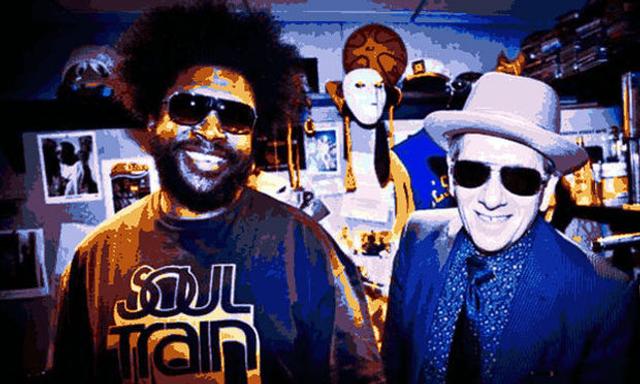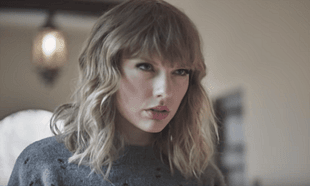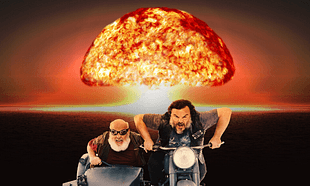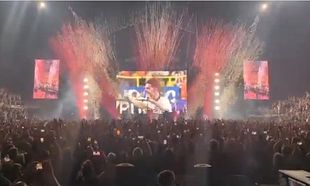Elvis Costello and The Roots have announced a collaborative album entitled Wise Up Ghost will be exclusively released by Blue Note Records on Tuesday September 13th
The existence of the record was first revealed by ?uestlove as an aside during an interview with Billboard Magazine in January. A small number of test pressings were distributed as white labels on Record Store Day on the 20th of April but the full release will follow later in the year.
Elvis and ?uestlove explain the collaboration to us further...
How did this project start?
Ahmir Thompson: Elvis first came on the Jimmy Fallon show in 2009. I knew he was a fan of theVoodoo album I did with D'Angelo, so we asked if he would be open to the idea of “remixing” his stuff. He was into it, so we did these radical versions of “High Fidelity” and “I Don't Want to Go to Chelsea,” and he loved it. Then we did that a second time the next year, and then last year he was on when the show did a Bruce Springsteen tribute week.
At that point, I kinda subliminally put out the idea of a larger collaboration. I was passive-aggressively suggesting it—I was too afraid to actually say, “Let's make a record together.”
Elvis Costello: We were walking off the set of the show together after we did “Brilliant Disguise” and Quest dropped this little code phrase to me. I don’t think I ever want to tell people which band, which singer, and what record he named, but I knew what he meant right away. While I knew we couldn’t make that record, I hoped that we might be able to make this record.
It seemed like a good playground, a fabulous ride, to go in and play with a great band that has a broad-minded view of music. It felt like anything was possible.
What was your actual process for writing these songs?
Costello: Somebody would lead the way, the same way as any song construction. It was done in dialogue rather than in performance—like the game Exquisite Corpse, where one person's story follows the other, or when you fold a paper doll and then draw the legs on. We had already played together, we knew what that felt like, but we wanted different perspectives.
We were really about a work-in-progress, mixing from day one, and developing as the ideas came through. But we didn't need to discuss it very much. We never had one conversation about what we were trying to do, we just did it. We played and the picture emerged, and then you try to sharpen the picture.
Thompson: Most powerful songs first have to sound powerful as a skeleton. So usually we started with just drums and piano, and if it was strong as a two-man project, then we'd go to next level and bring in the band. We would riff ideas, nonsensical words, then flesh that out once we had format down, and then Elvis would come back with lyrics and vocal parts intact.
We started last August and, through December, once or twice a week he'd stop by. Initially we were emailing tracks, but we wanted real-time exchange. We recorded a lot of it in our tiny little dressing room at 30 Rock, not a traditional studio, but Elvis had no hang-ups about that.
When could you tell that it was turning into an album?
Thompson: We have like 4000 tracks in a database, so we gave a drum track to Elvis, and days later he came back with a full-fledged demo. We tried two more, then three more, and the next thing you know, we had something on our hands. With no label and no deadlines, the process could stay really relaxed.
Costello: We didn’t know what form it might take, whether it was a song or an EP or what. But ideas kept tumbling out, and they seemed connected by an approach to rhythm and lyric writing.
I don't know the name for this music. It's a cauldron full of powders and potions, frogs and fingers, and that's what I call rock and roll—because that's what it was, originally. I'm not much bothered about the labels, though. What I care is whether we like it and can stand by it.
Did you have any sound in mind, any target on the wall when you started out?
Costello: The last thing you want is for people to say, “Ah, I know what they're doing.” Then they've already heard half the record in their mind. But just to be clear: this is not my hip-hop record. That would be an easy dismissal, and would be doing the Roots a huge disservice that that's as far as we would think, just some gimmick.
Thompson: The way society is now, lines are blurring, people are trying to amalgamate everything and get rid of velvet ropes as best they can. The Roots and Elvis Costello are both known for doing a lot of experimenting—certainly, no group in hip-hop has tested the limits of patience and stretched the knowledge base of their fans like we have.
I just knew that I didn't want to do anything less than an album that will hold up in twenty years, a Top Ten Elvis Costello album. An album that a 24-year-old me would freak out about.
Costello: When you do something wildly different from that which you're known for, it can surprise or even outrage people. But you don't make music based on who might not listen to it. You follow your heart.
Let’s talk about the lyrics - for a recording process that sounds so pleasurable, the words on this album are pretty relentlessly apocalyptic.
Costello: I didn't set out to write something bleak, but you can't deny the things you see and feel. If you look out the window, turn on the TV, read a newspaper, it's all true. I'm not saying anything unprecedented—it seems we’re settling for things the way they are, accepting the idea that happiness comes at the expense of someone else and that's just the way it is.
It’s really an accumulation of images over a number of years, seeing the commonality of events. I think there used to be a bigger dream, and I'd rather we have something better to look forward to.
Thompson: I wondered if Elvis would be as wordy and dense as he was on his classic albums, and he was right on it. Even the love lyrics are vividly descriptive; it's been a long time since I've worked with a singer that made me see what I'm listening to, who's not just trying to get a rhyme scheme going—it's rare to find someone who pushes the limits of lyrics and still maintains a sense of accessibility.
And still, the album ends with a glimmer of hope, with an open-ended yearning for faith on “If I Could Believe”
Thompson: The method inside the Roots has always been me as the music guy—I don't even like recording vocals. But listening to this record, looking for video ideas, I started to think, “Yo, this is the most apocalyptic love story I've ever heard!” I mean, there’s also songs like “Tripwire,” which is just beautiful and lush, like a lullaby. But I felt like we needed a breather at the end, something to land the plane a little bit, and Elvis was open to the idea, so “If I Could Believe” was one of the last things we worked on.
Costello: “If I Could Believe” is a straightforward and heartfelt question, with just the barest arrangement—which I suppose is appropriate to this End of Days theme park. But I think that throughout, the music is joyful, deliberately playing a counterpoint to the lyrics. It’s all about trying to feel some life, some humanity.




















































































